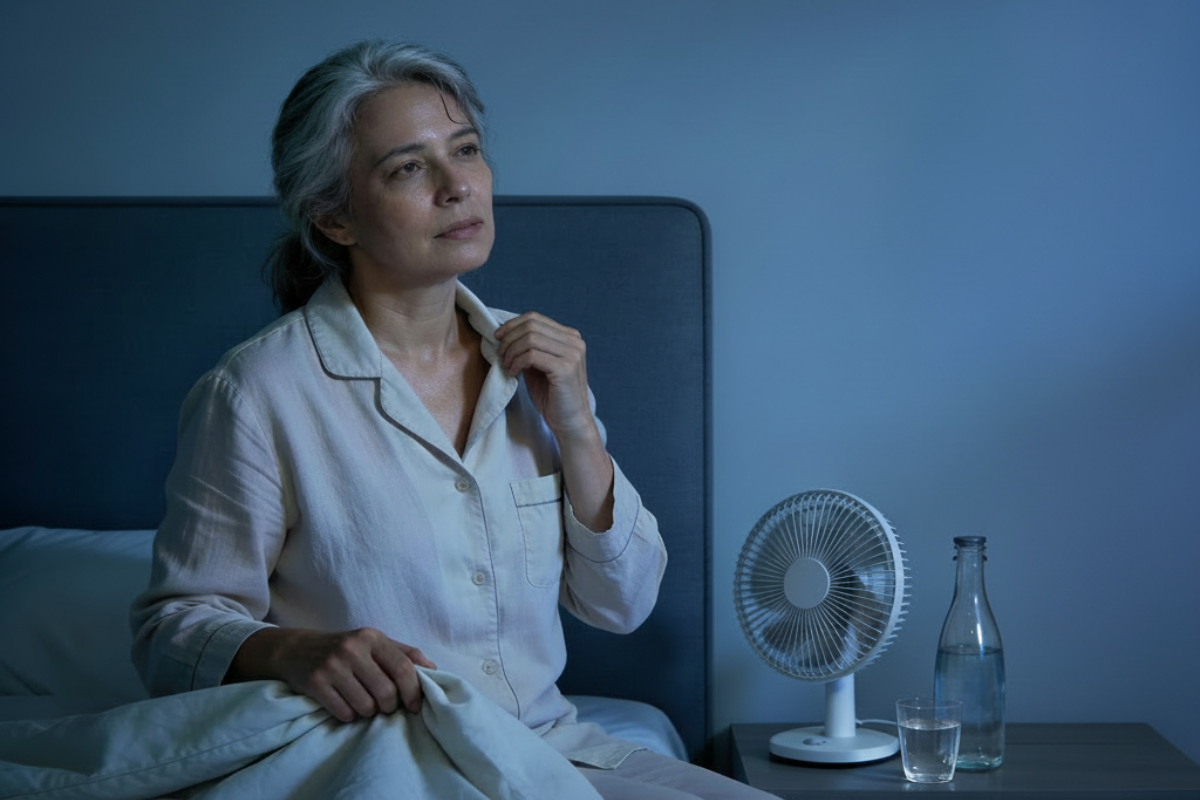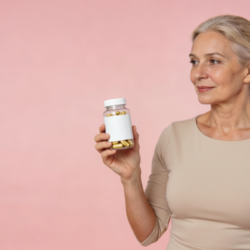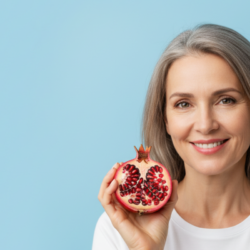Menopause is a natural phase in a woman’s life, often accompanied by troublesome symptoms such as night sweats. These episodes of excessive sweating occur during sleep, causing frequent awakenings and disrupting the quality of sleep. The main causes are hormonal fluctuations, in particular a drop in oestrogen levels, but factors such as stress, spicy food, caffeine or alcohol consumption, certain medicines and high ambient temperature can also contribute.
How can you recognise night sweats?
Night sweats are episodes of excessive sweating that occur during sleep. They can cause frequent awakenings and disrupt sleep quality. Signs include:
- Profuse sweating, sometimes enough to soak the sheets.
- Sensation of intense heat followed by shivering.
- Rapid heartbeat.
What causes night sweats?
Night sweats are mainly caused by hormonal fluctuations, in particular a drop in oestrogen levels. Other factors may include:
- Stress and anxiety.
- Spicy or hot food before bedtime.
- Consumption of caffeine or alcohol.
- Specific medications.
- High ambient temperature.
Why do I have hot flushes at night?
Hot flushes, often accompanied by night sweats, are the result of hormonal changes. Blood vessels dilate, increasing blood flow and causing a sensation of heat. Excessive sweating is the body’s mechanism for regulating this heat.
How long do night sweats last?
The duration of night sweats varies from woman to woman. On average, they can last from a few months to several years, generally around 4 to 7 years. Certain factors such as stress or medical conditions can prolong their duration.
Night sweats: When to worry?
Although night sweats are often benign, there are certain signs that require medical attention:
- Unexplained weight loss.
- Excessive sweating outside the night.
- Sweating accompanied by chest pain or breathing difficulties.
- Sudden onset unrelated to the menopause.
Tips for relieving night sweats naturally
Maintain a cool room temperature:
- Use a fan or air conditioning.
- Choose breathable cotton sheets.
- Use a humidifier or thermal water spray.
Eat a balanced diet:
- Avoid spicy foods and hot drinks before going to bed.
- Increase your intake of Omega 3
- Limit alcohol and caffeine consumption.
Manage stress:
- Practise relaxation techniques such as meditation or yoga.
- Follow a regular sleep routine.
- Use natural food supplements to relieve stress and anxiety: Puressentiel Aroma Stress Duo Stress 30 capsules, Puressentiel Aroma Stress Roller 5 ml, Santarome Organic Bud Complex Stress 30ml
Appropriate clothing :
- Wear light cotton clothing.
- Use several layers to adapt easily to temperature changes.
Natural remedies :
Phytoestrogens are plant-based compounds that mimic the oestrogens produced by the human body. They can help regulate the hormonal imbalances responsible for night sweats. It is advisable to take phytoestrogen-based food supplements after consulting a health professional to determine the appropriate dosage.
- Taking phytoestrogen-based food supplements, such as soya: Granions Menopause Night Sweats 56 Capsules, Bio-Life Be-Life Isoflavone 60 Natural Fermented Soya Extract, Santarome Organic Menopause Bud Complex 30ml, Nutreov Menophytea Balancing Heat Flushes 40 Capsules…
- Essential oils can also provide relief.Clary sage essential oil is particularly well-known for its beneficial effects on menopausal symptoms. Here’s how to use it effectively:
- Diffusion: Add a few drops of clary sage essential oil to a diffuser to inhale its benefits.
- Skin application: Dilute clary sage essential oil in a carrier oil (such as sweet almond oil) and massage gently into the lower abdomen or wrists.
- Aromatic bath: Add a few drops of Clary Sage essential oil to a warm bath for deep relaxation.
Essential oils offer a natural, holistic approach to managing night sweats. However, it is essential to check for any allergies and consult an aromatherapy specialist for personalised advice.





